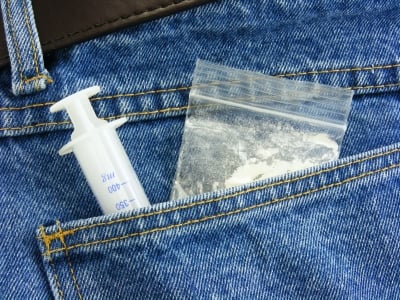
Sweeping changes became effective on October 1, 2013, in Colorado’s drug laws. We are now operating under C.R.S. 18-18-403.5 and C.R.S. 18-18-404, in Denver, Jefferson and Arapahoe County. Under these statutes and C.R.S. 18-1.3-401.5, a new class of crimes has been created: Drug Felony Crimes and Drug Misdemeanor Crimes. These changes will impact most of our clients charged with possession and distribution or manufacture of drugs like methamphetamine (meth), cocaine, heroin and other serious Schedule I and II drugs.
How the New Drug Crimes Classes Look
For example, designated as DF1, for Drug Felony Class 1 or Level one Drug Felony, the new presumptive range sentencing scheme looks like this:
| Level | Presumptive range | Period of Parole |
| DF1 | 8-32 years | 3 years |
| DF2 | 4-8 years | 2 years |
| DF3 | 2-4 years | 1 year |
| DF4 | 6 months-1 year | 1 year |
The chart above, with more specifics at C.R.S. 18-1.3-401.5, further details the aggravated range and fine ranges for these crimes. In the past, we did not have specific Drug Felony classifications. These offenses were classified the same as other felony crimes from a lower class 6 up to a high of a class 2 felony.
Why the New Drug Classifications in Colorado?
We believe the Colorado legislature has established this new classification for drug offenses in an effort to distinguish these crimes from other felony conduct, particularly with drug possession offenses. Colorado prisons house a disproportionately large number of drug users, at an annual cost to taxpayers of $33,000. Hopefully, our legislature is starting to realize that while harmful to society, drug use is not worthy of the cost of long prison sentences. We simply cannot afford to institutionalize everyone who is a cocaine, methamphetamine (meth) or heroin drug user. Instead, we should be concentrating on successful treatment models and programs. These new drug classifications will make it easier for lawmakers, DOC (Department of Corrections), judges, probation, District Attorneys, and Parole to categorize offenders and move them into programs based on the seriousness of their offense.
Our experienced drug possession and drug distribution lawyers practice in Adams, Weld, and Douglas County, and are ready to meet with you to explain how we can make the difference in your case. We are connected with treatment professionals who have the tools to evaluate and treat addictive drug behavior. With our legal skills and their treatment protocols, our team can make the difference before a busy judge in your criminal case. Experience counts and we have it.
Always remain silent when approached by police and then contact our attorneys at 303-731-0719 for a free consultation at our office. Together, we can protect your future.


